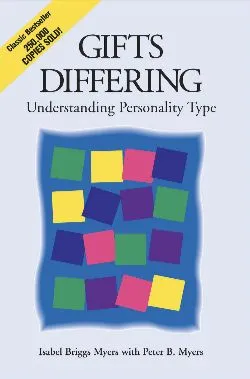
A few months ago, I began to get really curious about ways of compartmentalizing personality. It goes without saying that the most respectable framework is the Big Five personality traits, a heuristic that divides a person’s way of being into five larger categories: openness, conscientiousness, extraversion, agreeableness, and neuroticism. However, there have been numerous other frameworks put forth, some of which are scientific, some are not.
This book introduces the Myers-Briggs Personality Typology, which is itself based on the work of C. G. Jung. Instead of seeking out specific personality traits, as the Big Five does, Myers-Briggs seek out cognitive functions. There are four categories of functions, and the only one really shared with the Big Five is that of extraversion/introversion. The Myers-Briggs also includes categories on sensing/intuiting, thinking/feeling, and judging/perceiving. A person’s personality type is determined by the cognitive functions that they prefer, as this is what they will fall back on unconsciously.
The book begins with an introduction of the different cognitive functions then goes on to discuss the ways in which they might manifest in areas of life: relationships, occupations, and so on. I was especially interested in the extensive discussions of the sensing/intuiting and judging/perceiving type. I see myself as what Myers and Briggs would call the “introverted intuitive” with a solid judging streak.
There is plenty of discussion elsewhere about the limitations of Myers-Briggs Personality Typology, and you can seek it out. My primary issue is not that it is unscientific: I am not a psychologist and this does not matter so much for me, I just want to understand myself a bit better. My issue lies more in the way that it has been taken up by HR departments across the world. It seems to be much more prominent in occupational therapy than other fields, and I don’t know if that is necessarily a good thing.
Even so, this is really the first book publishes on the Myers-Briggs Personality Typology, and it does its job remarkably well. The writing style feels postwar American, but that is not a serious issue: it’s much better than the corporate lingo we find ubiquitously today.
For those curious about personality type, this is worth the read, even if it isn’t the most scientific reading of personality.